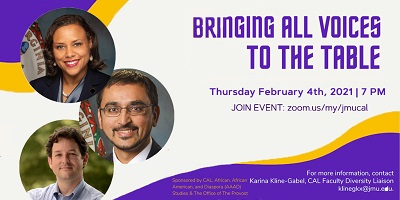 Bringing All Voices to the Table
Bringing All Voices to the Table
A virtual discussion with Virginia State Leaders: Dr. Janice Underwood, Virginia’s Chief Diversity, Equity & Inclusion Officer; Atif Qarni, Secretary of Education; and Alfonso Lopez, Member of the Virginia House of Delegates
Thursday, February 4th, 7:00 p.m.
Join event @ zoom.us/my/jmucal
 AAAD Black History Month Programming
AAAD Black History Month Programming
Join the African, African American, and Diaspora Studies Center and their partners for the annual observance of Black History Month (February), including the 11th Annual AAAD Interdisciplinary Conference and much, much more. All AAAD Studies Center events honor, recognize and celebrate Black peoples, histories, cultures, languages, economies, technologies, philosophies, ideas, and politics. Information on these events is available in the 2021 AAAD Black History Month Program.
Also participate in social media events and conversations on AAAD Social Media Platforms
Facebook: @JMUAAAD
Twitter: @aaadstudies
Instagram: @aaadstudiesjmu
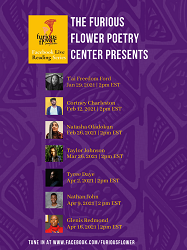 Furious Flower Facebook Live Reading Series
Furious Flower Facebook Live Reading Series
Furious Flower is pleased to present a spectacular lineup of poets as a part of our Furious Flower Facebook Live Reading Series, sponsored by the National Endowment for the Arts (NEA). Events will stream live on our Facebook page and will also be uploaded to our YouTube channel the following week.
Next reading: Cortney Charleston, Friday, February 12th, 2:00 p.m.
On Facebook @FuriousFlower
 American Prophets: The Religious Roots of Progressive Politics and the Ongoing Fight for the Soul of the Country
American Prophets: The Religious Roots of Progressive Politics and the Ongoing Fight for the Soul of the Country
Join us on Facebook Live for a discussion with Jack Jenkins, an award-winning journalist and national reporter for the Religion News Service. He covers religion. Also politics. Usually both. Post your questions for Jack in the event discussion or during the Facebook Live.
Thursday, February 11th , 1:00
Facebook Live Event link
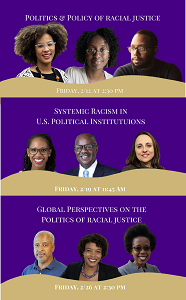 Teaching and Learning the Politics of Racial Justice
Teaching and Learning the Politics of Racial Justice
Three part Virtual Symposium
The Symposium brings leading scholars of the politics of race and ethnicity together to present their research in political science, public policy and administration, and international affairs.
Part 1: The Politics and Policy of Racial Justice in the US: This panel will focus on the relationship between race, ethnicity, and intersectionality, and public policy processes such as social movements, state-building, agenda-setting, and policy feedback.
Friday Feb. 12th, 2:30 p.m., Facebook Live Event Link
Part 2: Systemic Racism in US Political Institutions: This panel will look at race, ethnicity, and intersectionality in US political institutions, with an emphasis on problems of descriptive and substantive representation and feature.
Friday Feb. 19th, 11:42 a.m., Facebook Live Event Link
Part 3: Global Perspectives on the Politics of Racial Justice: This panel will explore race, ethnicity, and intersectionality in the global context, including comparative perspectives, foreign policy, and international security.
Friday Feb. 26th, 2:30 p.m., Facebook Live Event Link
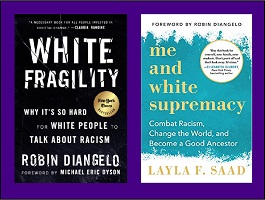 WAKE UP – White Accomplices Knowing Experiences Underlining Privilege Book Club
WAKE UP – White Accomplices Knowing Experiences Underlining Privilege Book Club
WAKE UP is a book club is designed to support racial inclusion and justice efforts at JMU through the growth and development in understanding white identities and experiences in order to become better allies to People of Color. WAKE UP will meet twice a month, read books related to white identities and racial justice and discuss strategies for interrupting racism at JMU and our broader society. The books we will be reading are: me + white supremacy by Layla Saad and White Fragility by Robin DiAngelo.
All faculty and staff are invited to join. While this group is aimed at white people who are committed to developing strategies for interrupting racism as they examine their own identity and privilege, People of Color are also welcome in this space, and their perspectives and thoughts will be honored. It is critical that participants commit to attending all 6 meetings. There will be virtual options for all groups. We will have books available for participants to use. If you are interested and committed to joining this group, please complete this RSVP form.
Three groups offered this spring:
Tuesdays 3:30 - 4:30 p.m. starting February 16th
Wednesdays 2:30 - 3:30 p.m. starting February 17th
Thursdays 9:00 -10:00 a.m. starting February 25th
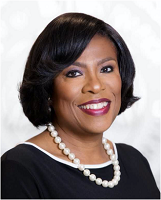 The Political, Social, and Creative Power of Black Women in Collectives
The Political, Social, and Creative Power of Black Women in Collectives
Sisters in Session - Black Women in the Academy Conference
This year’s conference focuses on the sustaining power of Black Women in collectives and in collective action as rooted in a long history of Black women movements, evidenced in their continual political organizing that has supported positive efforts for greater inclusion, and sustained by transformational self-care practices. The Keynote speaker is the Honorable Sharon Weston Broome, Mayor-President of Baton Rouge Louisiana.
February 17th, 8:00 a.m. – 12:00 p.m.
For more information and to register please visit the Black Women Conference page
Registration deadline is February 12th
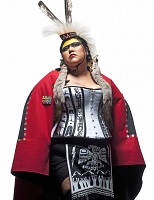 Honey and Sweetgrass
Honey and Sweetgrass
The Duke Hall Gallery of Fine Art welcomes multidisciplinary artist Skeena Reece for her exhibition Honey and Sweetgrass. Based in British Columbia, Reece is of Tsimshian/Gitksan and Cree descent, and her performances combine indigenous culture, myth and humor to address racial stereotypes and the effects of colonization. In Honey and Sweetgrass, Reece will exhibit a range of performance art, videos, photography and installation works.
Now through March 7th, Duke Hall Gallery of Fine Art
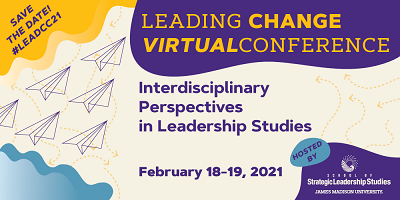 Leading Change Virtual Conference
Leading Change Virtual Conference
Interdisciplinary Perspectives in Leadership Studies
The School of Strategic Leadership Studies is hosting the Leading Change Virtual Conference (#LEADCC21) via Zoom on February 18 and 19. This online event will include Ask the Expert Q&A sessions, moderated Expert Panels, and paper presentations with representation from over 30 higher education and professional organizations. The paper presentation session will be dedicated to Diversity and Inclusivity in Organizations. JMU faculty, staff, and students are encouraged to attend. Registration is required ($15 for students, $30 for faculty/professionals).
To register please visit the Leading Change Conference page.
Registration deadline is February 5th
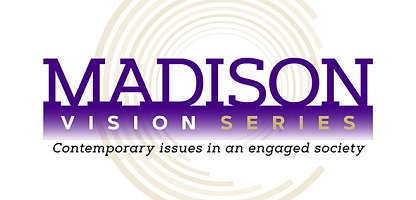 Sharing Stories of Success and Triumph: Black Alumni through the Decades
Sharing Stories of Success and Triumph: Black Alumni through the Decades
Madison Vision Series Panel Event
In honor of Black History Month, we have invited Charles May ‘83, Dr. Darian Parker ‘01 ‘03M, Melvin Petty ‘84, Angela Reddix ‘90, and Faye Tate ‘78 to discuss their own journeys to success after their time at James Madison University.
Wednesday, February 24th, 7:00 p.m. - Live stream on JMU's Facebook and YouTube Pages
 Closed Captioning with TechSmith Knowmia
Closed Captioning with TechSmith Knowmia
Online Workshop offered by JMU Libraries
Video accessibility ensures that all students can equally access recorded lectures and instructional videos. Whether you wish to incorporate Universal Design Learning (UDL) into your online teaching or provide your students with diverse viewing options to keep them engaged, this workshop walks you through the very first steps. No prior knowledge of UDL or video accessibility is needed.
Registration Required
Wednesday, February 24th, 1:00 – 3:00 p.m., Registration link
Thursday, February 25th, 1:00 – 3:00 p.m., Registration link
Recognizing Implicit Bias and Responding to Microaggressions
College of Business Diversity Council Speaker Series
Nkechi Ejimadu, Deloitte, Strategy and Operations Manager
Nitcelle Emanuels, Dell Technologies, Director, Global Diversity & Inclusion
Asumini Kamulegeya, Deloitte, SCM Operations Manager
Recognition of an existing problem is usually the first step towards producing a solution. Many of our existing problems regarding diversity, equity, justice, and inclusion stem from our implicit biases. Therefore, recognition of implicit biases towards others, who are not like us, is a first step but not the end of one’s journey towards equitable inclusion of others. Beyond recognition of implicit biases, we need to understand that none of us are immune from bias and we should be ready to respond (rather than stand by and watch) when biases give way to microaggressions.
Thursday, February 25th, 6:30 – 8:00 p.m.
Live Panel Discussion (via Zoom, recorded for later viewing)
For more information and to register please visit the COB Diversity Council page
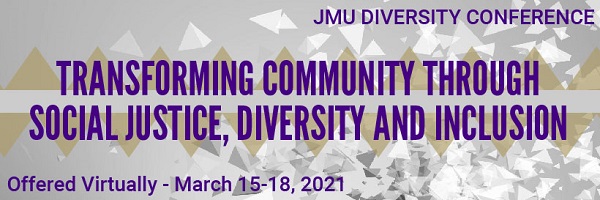
Transforming Community through Social Justice, Diversity and Inclusion
2021 Diversity Conference
The Office of the President is pleased to announce the annual Diversity Conference in a revised, flexible format. We are offering four days of opportunities with over 30 virtual sessions including lunchtime and late afternoon panel discussions. Dr. Janice Underwood, the Commonwealth of Virginia’s first-ever Chief Diversity Officer, will provide the lunchtime keynote address on Wednesday, March 17th.
Offered Virtually via Zoom – March 15-18
Women in Politics: In Their Own Words
Virtual Book Display – JMU Libraries
What do women in American politics have to say about their lives, their work, and their other passions or areas of expertise? Find out in these works—memoirs, academic books, letters, essays, dissertations, and more. Link to virtual book display
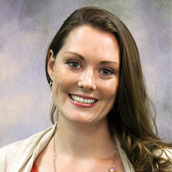 Asking and Answering Difficult Questions About the Impact of Racism in Early Childhood Education: A Panel Discussion
Asking and Answering Difficult Questions About the Impact of Racism in Early Childhood Education: A Panel Discussion
You are invited to attend a webinar featuring College of Education faculty member Dr. Mira Williams titled Asking and Answering Difficult Questions About the Impact of Racism in Early Childhood Education: A Panel Discussion. This panel will explore various aspects of racism in early childhood education. Early childhood educators will leave with tools and strategies to handle situations involving racism in their classrooms and programs with sensitivity and care.
Offered Virtually March 16th, 1:00 – 2:00 p.m.
Registration link
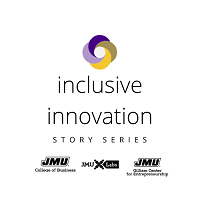 Inclusive Innovation Story Series
Inclusive Innovation Story Series
Theme: Black Innovation Matters
The Inclusive Innovation Story Series (I2S2) seeks to celebrate barrier-breaking, cutting edge, and visionary stories from under-represented groups of JMU students, faculty, staff and alumni through Tedx Style presentations and events. Each year will highlight a different part of the JMU community that makes our campus a thriving and vibrant place to learn and work, while also allowing a space for honest conversations and common ground. This year’s event will highlight stories of how Black Innovation Matters to you.
Please submit story applications by February 7th; Live streamed gala event evening of March 16th.
To learn more and submit your story, please visit the I2S2 webpage or email cfe@jmu.edu
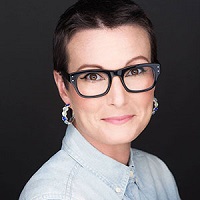 LGBTQ-Inclusive Hospice and Palliative Care
LGBTQ-Inclusive Hospice and Palliative Care
Kimberly Acquaviva, PhD, MSW, CWE
Borne out of her lived experience and research, Dr. Acquaviva is the author of LGBTQ-Inclusive Hospice and Palliative Care: A Practical Guide to Transforming Your Practice. Dr. Acquaviva is unique in being a social worker and nursing faculty. She is the Betty Norman Norris Endowed Professor in the School of Nursing at the University of Virginia. Her presentation is part of Social Work Month, acknowledging the contributions and work of social workers.
Wednesday, March 24, 6:00 - 7:00 p.m.,
Live video presentation via Webex
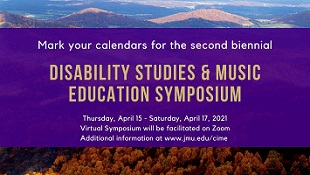 Disability Studies and Music Education Symposium
Disability Studies and Music Education Symposium
The planning committee for Disability Studies and Music Education Symposium invites you to attend their second biennial event. Through the symposium theme, Intersectionality of Disabled Persons/Persons with Disabilities’ Experiences In, With, Through, and Around Music, presenters will share sessions that will examine disability through disability studies and adjacent frameworks.
Thursday, April 15 – Saturday, April 17
Offered virtually. For more information please visit the Center for Inclusive Music Engagement events page.
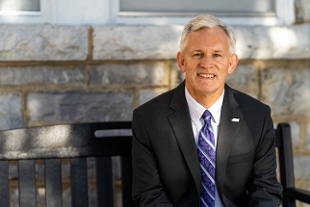 Listening to a Wide Variety of Voices
Listening to a Wide Variety of Voices
 Bringing All Voices to the Table
Bringing All Voices to the Table AAAD Black History Month Programming
AAAD Black History Month Programming Furious Flower Facebook Live Reading Series
Furious Flower Facebook Live Reading Series American Prophets: The Religious Roots of Progressive Politics and the Ongoing Fight for the Soul of the Country
American Prophets: The Religious Roots of Progressive Politics and the Ongoing Fight for the Soul of the Country Teaching and Learning the Politics of Racial Justice
Teaching and Learning the Politics of Racial Justice WAKE UP – White Accomplices Knowing Experiences Underlining Privilege Book Club
WAKE UP – White Accomplices Knowing Experiences Underlining Privilege Book Club The Political, Social, and Creative Power of Black Women in Collectives
The Political, Social, and Creative Power of Black Women in Collectives Honey and Sweetgrass
Honey and Sweetgrass Leading Change Virtual Conference
Leading Change Virtual Conference Sharing Stories of Success and Triumph: Black Alumni through the Decades
Sharing Stories of Success and Triumph: Black Alumni through the Decades Closed Captioning with TechSmith Knowmia
Closed Captioning with TechSmith Knowmia
 Asking and Answering Difficult Questions About the Impact of Racism in Early Childhood Education: A Panel Discussion
Asking and Answering Difficult Questions About the Impact of Racism in Early Childhood Education: A Panel Discussion Inclusive Innovation Story Series
Inclusive Innovation Story Series LGBTQ-Inclusive Hospice and Palliative Care
LGBTQ-Inclusive Hospice and Palliative Care Disability Studies and Music Education Symposium
Disability Studies and Music Education Symposium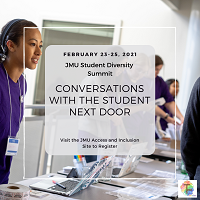 Student Diversity Summit
Student Diversity Summit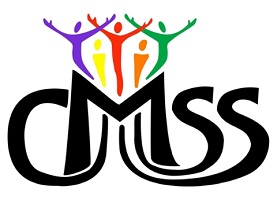 Center for Multicultural Student Services Events
Center for Multicultural Student Services Events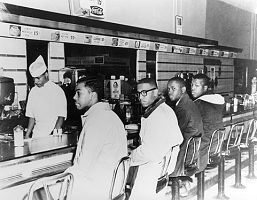 A Seat at the Table
A Seat at the Table Isra Chaker – Cultural Series Speaker
Isra Chaker – Cultural Series Speaker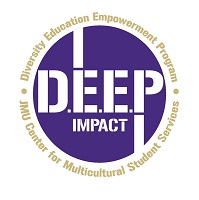 D.E.E.P. Impact Dialogue Series
D.E.E.P. Impact Dialogue Series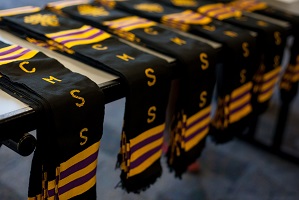 Donning of the Kente
Donning of the Kente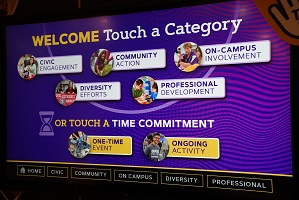 Diversity, Equity and Inclusion Events in the Engagement Hubs
Diversity, Equity and Inclusion Events in the Engagement Hubs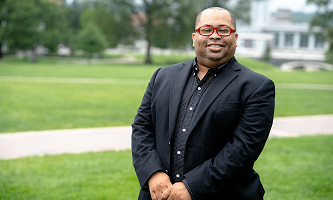 Owning Your Legacy & Learning from Your Identity
Owning Your Legacy & Learning from Your Identity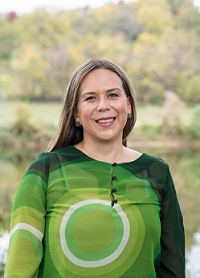 Hope for the Future
Hope for the Future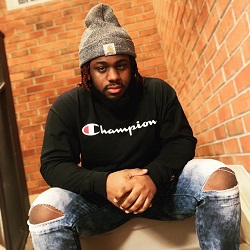 Make it Happen JMU
Make it Happen JMU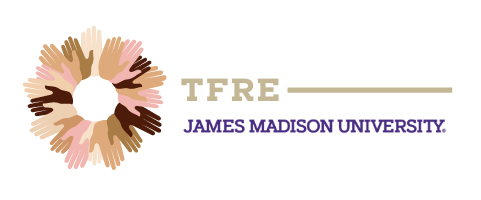
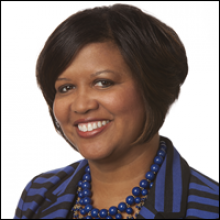 National Advisor
National Advisor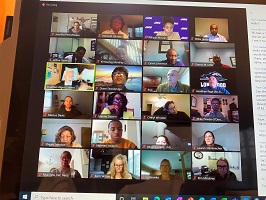 The first meeting of the full group was held December 17th with President Alger and the Task Force’s National Advisor Dr. Tia Brown McNair as speakers. They both spoke briefly and then President Alger answered questions from members. The recording of the December 17th task force meeting is
The first meeting of the full group was held December 17th with President Alger and the Task Force’s National Advisor Dr. Tia Brown McNair as speakers. They both spoke briefly and then President Alger answered questions from members. The recording of the December 17th task force meeting is 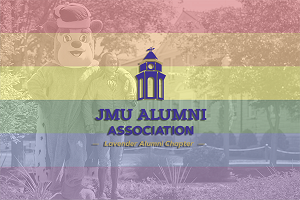 Lavender Chapter for Alumni
Lavender Chapter for Alumni The Pantry – A resource for Students
The Pantry – A resource for Students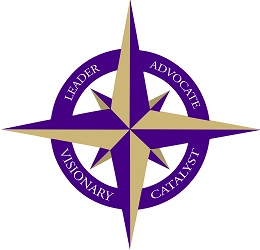 Compass Awards
Compass Awards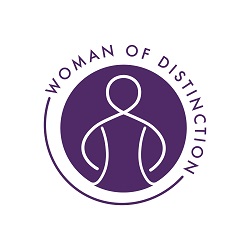 Woman of Distinction Awards
Woman of Distinction Awards Preparing Future Faculty Program
Preparing Future Faculty Program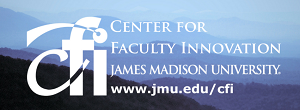 CFI creates Indigenous Land and Enslaved Peoples Acknowledgment
CFI creates Indigenous Land and Enslaved Peoples Acknowledgment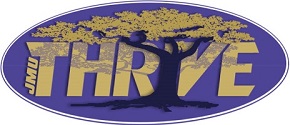 THRIVE Awards AIM Developmental Grants
THRIVE Awards AIM Developmental Grants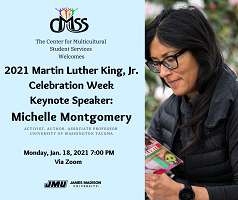 2021 Martin Luther King, Jr. Celebration Week
2021 Martin Luther King, Jr. Celebration Week